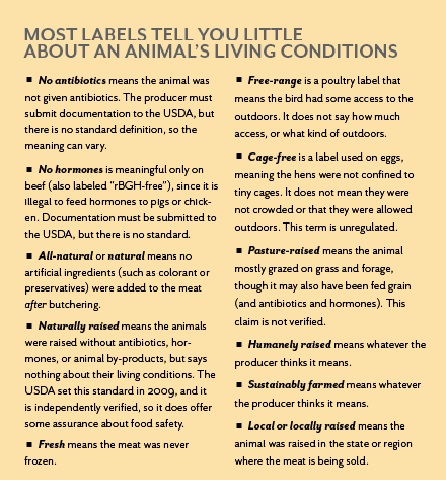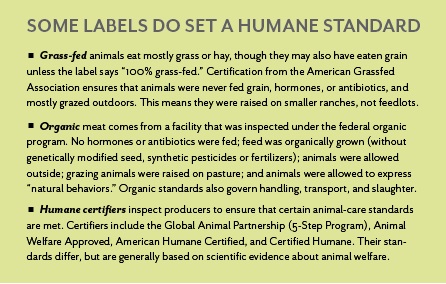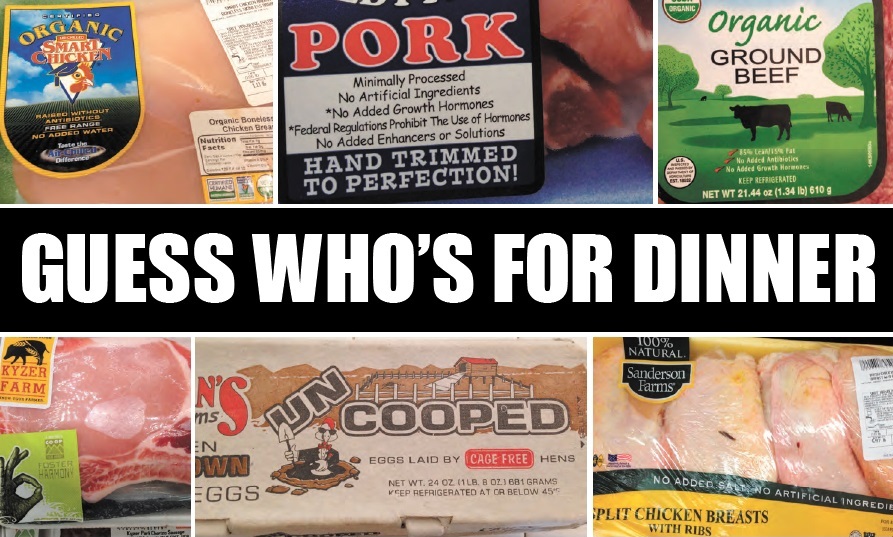ONCE UPON A TIME, vegetarianism for ethical reasons came down to how you felt about eating other animals. Omnivores could point to human biology and claim that the “Paleolithic diet” and other carnivorous habits were part of the natural order.
Nowadays, it’s not so easy—as food journalist Michael Pollan (The Omnivore’s Dilemma) famously points out. Human consumption of meat no longer parallels the dietary habits of wolves, lions, and other predators, because it has been turned into an industry that applies the logic of factory production to living creatures. What we are eating is not meat so much as shrink-wrapped packages of bioengineered protein.
No carnivore wants to think about this—least of all one who loves animals. But the ugly truth is that when you buy a regular package of meat at a regular supermarket, the animal inside most definitely spent its miserable life on a factory farm, subject to all the horrors implied by the term “industry standards,” according to Dena Jones, Farm Animal Program manager at the Animal Welfare Institute (AWI).
“Industry standards” are based on a legal minimum of care, Jones said, and are virtually the same everywhere, so there’s no need to sleuth out your market’s precise source—especially since 95 percent of meat sold in America is produced by just four corporations.
Factory farming is why meat is so cheap in America, frankly. Remember when steak was a rare treat for special occasions? Only the middle-aged will. Steaks are now produced on enormous feedlots with up to 100,000 cattle crammed onto a couple of hundred acres, eating and pooping continuously, pumped full of drugs so they won’t get sick, and then marched into a factory that butchers them at top speed. The situation is often worse for pigs, chickens, and turkeys, who may never set hoof outside.
NONE OF THIS is news, of course. But what do we make of the plethora of meat labels that have multiplied as a consequence, promising some hedge against moral nausea?
Sorting through them can be complex if you consider what each means individually, but quite simple when you’re looking only at what they say about how well an animal was treated. (The issue of how safe the meat is to eat is another matter, though related.)
Only two types of labels offer any guarantees that the animal inside led a semi-decent life: certified organic and certified humane. Most everything else, from “all natural” to “animal compassionate” to “sustainably farmed,” means nothing more than the producer’s say-so. The federal agency charged with regulating meat labels, the U.S. Department of Agriculture’s Food Safety and Inspection Service, “relies solely on information supplied by producers to determine whether claims related to humane animal treatment and sustainable agricultural practices are accurate and appropriate for use on a meat label,” according to a report by the Animal Welfare Institute.
This also means there is no consistency from one label to another. Producers do not have to (and often refuse to) tell the public what their label claim is supposed to mean, and USDA in most cases has set no standard. Given that “free-range,” “sustainable,” and similar claims are big business these days, producers do not lack motivation to exaggerate, play dumb, or lie.
Without a doubt, some producers do maintain high standards that they willingly share with consumers, even if they do not seek certification. They may sell directly at farmer’s markets, or have solid reputations that are verified independently by retailers such as Keller’s Farm Stores or La Montanita Co-op.
Unfortunately, the vast majority of market chains do not fall into this category. Eleanor Bravo, Southwest organizer for Food & Water Watch in Albuquerque, is even more blunt when it comes to trusting your source for meat. “You’d better know a farmer,” she says.
Bravo notes that the modern food system is simply not local, and “only a few companies control the vast majority of food in America.” While meat and fish must be labeled with their country of origin, this tells you nothing about how the animals were raised or treated.
The only person who really knows that is the grower himself or the market that buys from him—if that retailer bothers to find out.
Nothing compels retailers to trace the food supply chain back to its origin, which is why it is common for labels claiming humane, natural, sustainable farming to contain the very same meat from the very same factory farms packaged under different labels, according to Jones of the AWI. Retailers may be none the wiser—though they certainly know enough to price the organic meat considerably higher.
Believe it or not, there is good news in all of this—for your health and that of the animals you choose to eat. You can eat meat that was raised humanely without spending your entire paycheck.
Just eat half as much of it.



